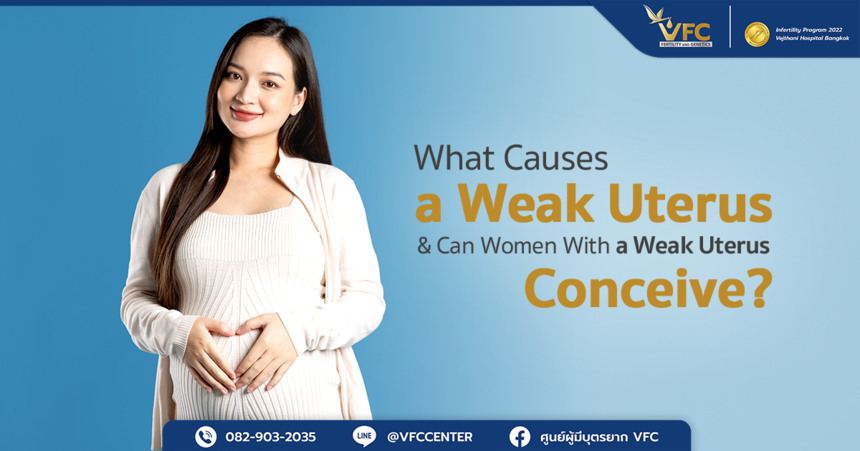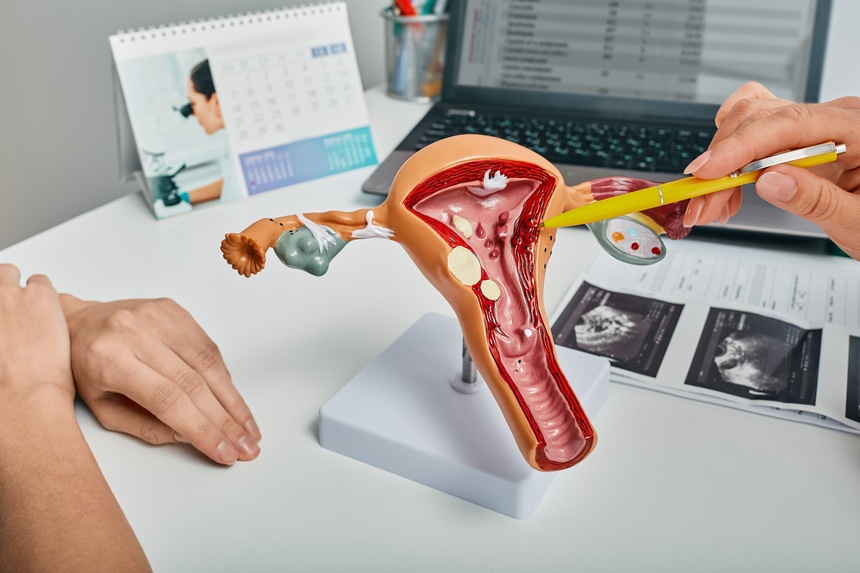
For many women who are trying to conceive, having a weak uterus can significantly hinder their efforts. A “weak uterus” isn’t a formal diagnosis; instead, it can be used to describe a uterus that struggles to support implantation, pregnancy progression, or both. Several underlying issues, including structural, hormonal, or functional problems, could be the reason for recurrent miscarriage or difficulty maintaining a pregnancy.
If you and your partner are concerned about your reproductive health, getting a comprehensive fertility test for couples is an important first step.
What is a Weak Uterus
A weak uterus is a condition that prevents the uterus from sustaining a pregnancy. It’s different from a uterine prolapse, which is a more severe condition caused by the downward displacement of the uterus into the vaginal canal. Signs of a weak uterus can include thin or damaged endometrial lining, poor muscular tone of the uterus, chronic inflammation or scarring, or hormonal imbalances affecting uterine function.
What Causes a Weak Uterus?
A weak uterus may result from several different underlying conditions, including:
Uterine Fibroids and Polyps
Noncancerous growths like fibroids and polyps can weaken the uterine wall, distort the uterine cavity, and impair embryo implantation. Symptoms of uterine fibroids and polyps can include heavy menstrual bleeding, pelvic pain, or bloating.
Endometriosis and Adenomyosis
Endometriosis is a condition in which tissue similar to the lining of the uterus, or endometrium, grows outside the uterus, often in the pelvic cavity. In contrast, adenomyosis is characterized by growth into the myometrium, which is the muscular wall of the uterus. These conditions are often associated with excessive menstrual flow and severe pelvic discomfort.
This has an impact on implantation, raising the risk of miscarriage.
Congenital Uterine Abnormalities
Some women are born with uterine malformations like a septate (a partially divided uterus cavity) or a bicornuate (heart-shaped instead of the normal pear-shaped) uterus. Recurrent miscarriages are often caused by these structural abnormalities.
Uterine Infections and Scarring
Problems with menstruation, pain, and infertility can result from pelvic inflammatory disease and sexually transmitted infections affecting the uterine environment. Scar tissue, caused by Asherman’s syndrome, from infections or surgical procedures, like Cesarean section, myomectomy, hysteroscopy, or dilation and curettage, can affect uterine muscle strength and function.
Hormonal Imbalances
Reproductive hormones like progesterone and estrogen are essential to prepare and sustain the endometrial lining for pregnancy. Uterine function can be impaired by conditions that disrupt hormone levels, including polycystic ovary syndrome, premature ovarian failure, and other hormonal imbalances.
Other Risk Factors
Chronic coughing and constipation put extra stress on the uterus and pelvic floor, potentially weakening the uterine structure over time. Factors like multiple vaginal deliveries, prolonged labor, or age-related muscle weakness, along with other conditions, can lessen uterine support.
Poor nutrition, obesity, smoking, chronic stress, and illnesses can weaken and damage the uterus over time.
Can Women With a Weak Uterus Get Pregnant?
In short, the answer is yes. Many women with a weak uterus can still conceive. It’s essential to identify the underlying issue early and work collaboratively with a fertility specialist to initiate a treatment plan. Regular monitoring and proactive condition management significantly improve the chances of a healthy pregnancy. Natural conception is possible for some women with hormone therapy or medical treatment, but others may need assisted reproductive technologies such as IVF and IUI.
How to Strengthen a Weak Uterus for Pregnancy
Uterus health can be supported in many ways, such as:
Medical and Hormonal Treatments
Progesterone treatment is commonly used to support endometrial growth and lessen the risk of miscarriage early in pregnancy. Treatment may include estrogen therapy or thyroid medication, depending on the hormone levels.
Surgical Interventions
Minimally invasive surgeries can help correct structural issues, such as myomectomy for fibroid removal, hysteroscopic removal of uterine septum or polyps, and adhesiolysis for scar tissue.
Lifestyle Changes
To support a healthy uterine lining, include leafy greens, healthy fats, and foods rich in iron, folate, and vitamin E in your diet. Improve pelvic circulation by engaging in regular low-impact activities like yoga and walking, avoiding alcohol and tobacco, and managing stress effectively.
Fertility Treatments for Women with a Weak Uterus

With over 15 years of experience in reproductive medicine, V Fertility Center offers fertility services for patients seeking to conceive but are dealing with complex uterine issues, such as:
In vitro fertilization (IVF): This procedure bypasses the fallopian tubes and allows direct embryo transfer into the uterus.
Intrauterine Insemination (IUI): This process places the processed sperm directly into the uterus during ovulation.
Preimplantation genetic testing (PGT): This process improves the chances of a successful pregnancy by selecting the healthiest embryos for implantation, thus lowering the risk of a miscarriage.
At V Fertility Center, our fertility specialists and cutting-edge reproductive technologies provide women who have a weak uterus with high-quality, personalized care, as well as comprehensive diagnostics and treatments to support healthy pregnancies. Contact us today.

The team of specialists in obstetrics and gynecology and reproductive medicine





No Comments
Sorry, the comment form is closed at this time.